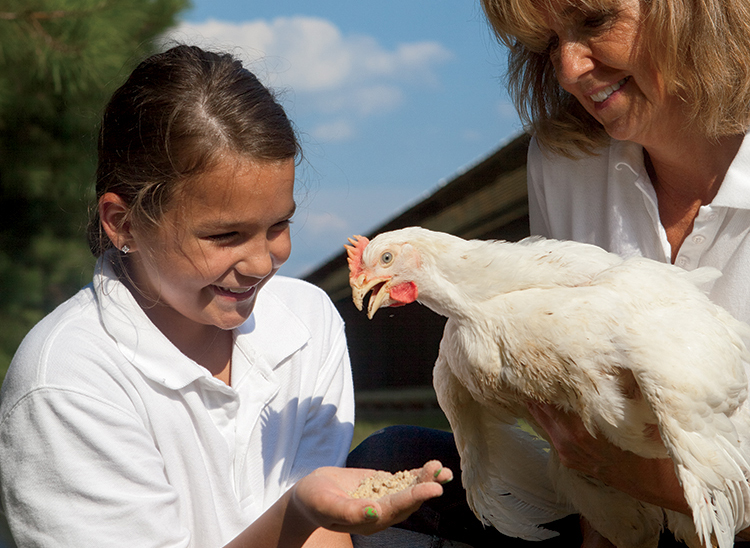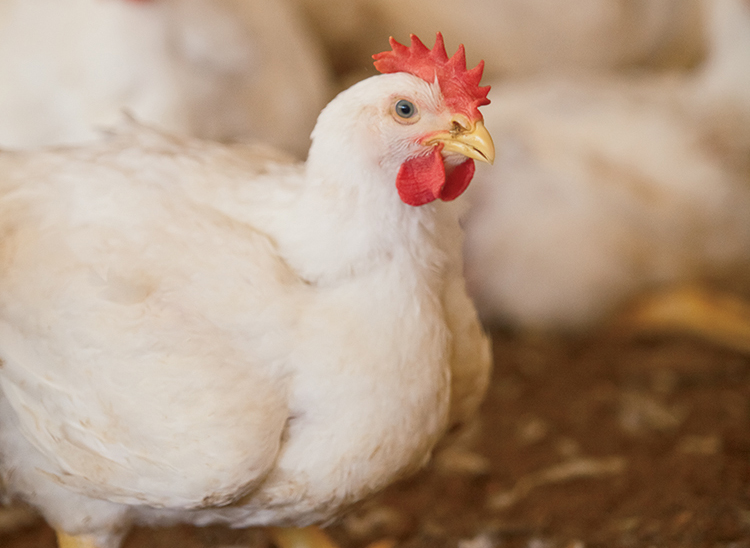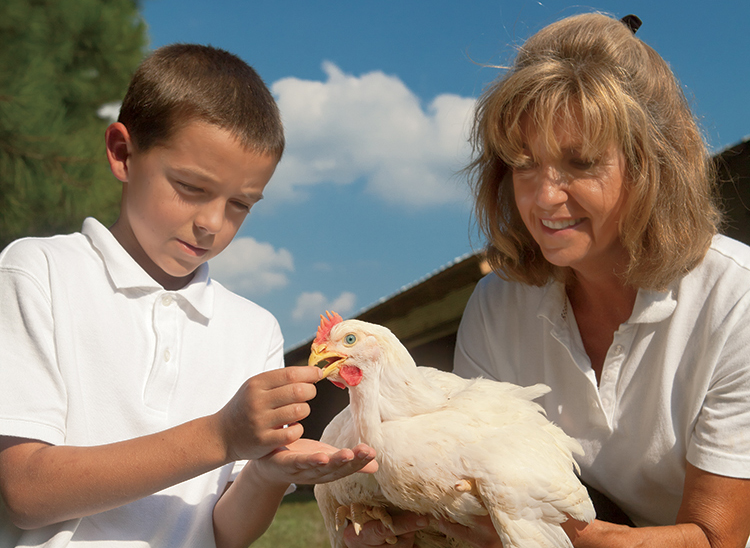Home > Mississippi > Mississippi Farm to Table > Mississippi Rules the Roost
Mississippi Rules the Roost
In partnership with: Mississippi Department of Agriculture and Commerce
 If birds of a feather flock together, then it stands to reason chickens rule in Mississippi. Whether the birds are layers or broilers, poultry still ranks as the state’s leading agricultural product. “The almost 800 million chickens per year raised on Mississippi’s 2,000 poultry farms bring $5 billion in annual income from around the United States and the world into our state’s economy,” says Mark Leggett, president of the Mississippi Poultry Association. According to Leggett, Mississippi’s poultry and egg industries have grown from a group of small family businesses into an integral supplier of protein for a growing world population. “We raise enough chickens for ourselves in this country and growth will come in our exports,” says Leggett. Broilers, which are chickens raised for meat, continue to make up the vast majority of poultry sales. Layers, chickens raised for laying eggs, constitute about 7 percent of the market. Even though layers are a minority, the production numbers are staggering. Alan Andrews, director of marketing at Cal-Maine Foods, says the company works with 42 laying operations. “We are very optimistic about the future,” he says. In fiscal year 2013, Cal-Maine sold about 948.5 million dozen eggs which represented about 21 percent of domestic shell egg consumption. Cal-Maine Foods, headquartered in Jackson, is the largest producer and marketer of shell eggs in the U.S. The industry leader sells most of its shell eggs primarily in the Southwest, Southeast, Midwest and mid-Atlantic regions. With a company like Cal-Maine in the state, it is no wonder Mississippi poultry production was valued at $2.53 billion in 2012.
If birds of a feather flock together, then it stands to reason chickens rule in Mississippi. Whether the birds are layers or broilers, poultry still ranks as the state’s leading agricultural product. “The almost 800 million chickens per year raised on Mississippi’s 2,000 poultry farms bring $5 billion in annual income from around the United States and the world into our state’s economy,” says Mark Leggett, president of the Mississippi Poultry Association. According to Leggett, Mississippi’s poultry and egg industries have grown from a group of small family businesses into an integral supplier of protein for a growing world population. “We raise enough chickens for ourselves in this country and growth will come in our exports,” says Leggett. Broilers, which are chickens raised for meat, continue to make up the vast majority of poultry sales. Layers, chickens raised for laying eggs, constitute about 7 percent of the market. Even though layers are a minority, the production numbers are staggering. Alan Andrews, director of marketing at Cal-Maine Foods, says the company works with 42 laying operations. “We are very optimistic about the future,” he says. In fiscal year 2013, Cal-Maine sold about 948.5 million dozen eggs which represented about 21 percent of domestic shell egg consumption. Cal-Maine Foods, headquartered in Jackson, is the largest producer and marketer of shell eggs in the U.S. The industry leader sells most of its shell eggs primarily in the Southwest, Southeast, Midwest and mid-Atlantic regions. With a company like Cal-Maine in the state, it is no wonder Mississippi poultry production was valued at $2.53 billion in 2012.  For growers like Cindy Tucker of Bay Springs, who has been raising broilers for Peco Foods, Inc. for nearly two decades, poultry has given her a rewarding lifestyle and career. “I started in 1995 and was really scared. Although I came from a long line of farmers, I was a hairdresser for 23 years!” says Tucker. Even as a complete beginner, Tucker found a truism that has held over the years. “Everyone from Peco to our association wants to see me succeed. I’ve always felt supported,” she says. Today, Tucker manages four houses, each with 20,000 birds, and she reflects on how the industry has changed. “Technology has improved so much, and everything is computerized. It’s more modern and energy efficient. Our job is to keep the birds happy and comfortable.” In about seven weeks, the broilers are ready for market. “We can grow larger birds, much faster today.” Tucker explains that growers and companies are keenly aware of consumer preferences for safe, healthy food supplies, and she works closely with many different agencies to ensure quality. “We work with health and environmental experts all the time and keep more records than we ever have,” says Tucker.
For growers like Cindy Tucker of Bay Springs, who has been raising broilers for Peco Foods, Inc. for nearly two decades, poultry has given her a rewarding lifestyle and career. “I started in 1995 and was really scared. Although I came from a long line of farmers, I was a hairdresser for 23 years!” says Tucker. Even as a complete beginner, Tucker found a truism that has held over the years. “Everyone from Peco to our association wants to see me succeed. I’ve always felt supported,” she says. Today, Tucker manages four houses, each with 20,000 birds, and she reflects on how the industry has changed. “Technology has improved so much, and everything is computerized. It’s more modern and energy efficient. Our job is to keep the birds happy and comfortable.” In about seven weeks, the broilers are ready for market. “We can grow larger birds, much faster today.” Tucker explains that growers and companies are keenly aware of consumer preferences for safe, healthy food supplies, and she works closely with many different agencies to ensure quality. “We work with health and environmental experts all the time and keep more records than we ever have,” says Tucker.  Through legislative support, the poultry industry now has another option for growers like Tucker: selling chicken litter. Previously, high transportation costs prevented market entry. It’s this type of tight collaboration that keeps the industry strong. “The industry is good at finding and correcting inefficiencies,” says Leggett. Likewise, the commercial and research sectors work together to keep the industry on the move. Looking to the future, Leggett says more U.S. chicken could be heading to China with the settlement of a recent trade dispute before the World Trade Organization. The poultry industry in Mississippi seems only set for continued success and growth, which is good for birds and people.
Through legislative support, the poultry industry now has another option for growers like Tucker: selling chicken litter. Previously, high transportation costs prevented market entry. It’s this type of tight collaboration that keeps the industry strong. “The industry is good at finding and correcting inefficiencies,” says Leggett. Likewise, the commercial and research sectors work together to keep the industry on the move. Looking to the future, Leggett says more U.S. chicken could be heading to China with the settlement of a recent trade dispute before the World Trade Organization. The poultry industry in Mississippi seems only set for continued success and growth, which is good for birds and people.



